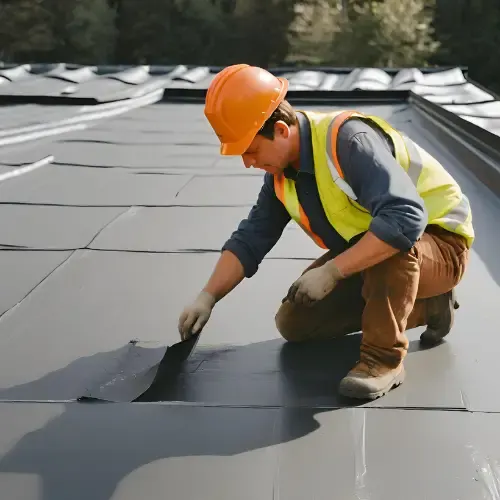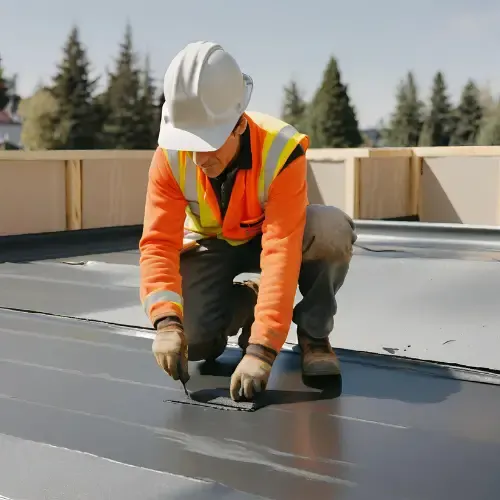
Modified Bitumen Roofing, a robust and versatile roofing system, has become a stalwart choice in the world of commercial and residential roofing solutions.
The innovative roofing material is engineered to withstand the most extreme weather conditions while delivering superior durability and longevity. What sets Modified Bitumen apart is its composition, combining asphalt with modifiers like rubber or plastic, enhancing its resistance to wear and tear.
A Modified Bitumen roof offers excellent waterproofing properties and can be installed using various techniques, including torch-applied, hot-mopped, or cold-applied adhesives, making it adaptable to different roofing scenarios.
Whether you’re looking for a reliable roofing option for a flat or low-slope roof, Modified Bitumen stands as a testament to the roofing industry’s dedication to innovation. However, it is important to understand, how modified bitumen roof systems work so that you can decide if this is the right material for you.
A Brief History of Modified Bitumen Roofing Systems
The history of Modified Bitumen Roofing also referred to as mod bit roofing system is a testament to the roofing industry’s quest for improvement and innovation. The material traces its roots back to the mid-20th century when the need for more durable and versatile roofing materials became apparent.
In the 1960s, modified bitumen roofing emerged as a response to the limitations of traditional asphalt roofing. The pioneering idea was to blend bitumen, a hydrocarbon byproduct, with modifiers such as styrene-butadiene-styrene (SBS) or atactic polypropylene (APP). These modifiers added resilience, flexibility, and enhanced weather resistance to the bitumen. Essentially, it would address the shortcomings of traditional roofing materials or built-up roofing systems.
Throughout the 1970s and 1980s, modified bitumen roofing gained popularity in commercial roofing applications due to its exceptional performance in low-slope and flat roof systems. It demonstrated superior waterproofing capabilities, resistance to temperature fluctuations, and enhanced longevity.
Over the years, modified bitumen roofing systems evolved further, offering various installation methods, including torch-applied, hot-mopped, and self-adhesive applications. These advancements made it even more accessible and versatile for roofing professionals, allowing them to cater to a broader range of roofing projects.
Today, Modified Bitumen Roofing continues to be a reliable choice for both commercial and residential roofing.

Types of Modified Bitumen Roofing System
Modified bitumen roofing is available in various types, each tailored to specific roofing needs with varying installation methods. Here are some of the key types of modified bitumen roofing:
SBS (Styrene-Butadiene-Styrene)
SBS-modified bitumen roofing is one of the most common types. It incorporates a rubber-like compound, SBS, which provides flexibility and excellent resistance to low temperatures. SBS roofing membranes are often installed using hot asphalt, cold adhesive, or heat welding.
APP (Atactic Polypropylene)
APP-modified bitumen roofing is known for its exceptional resistance to high temperatures and UV radiation. It uses a thermoplastic polymer, APP, which adds toughness and heat resistance. APP roofing membranes are typically applied using torch-on or heat-welding methods.
Self-Adhesive Modified Bitumen
Self-adhesive modified bitumen is gaining popularity due to its ease of installation. These membranes come with an adhesive backing that can be directly adhered to the roof substrate. They are available in both SBS and APP formulations. However, they still need to be applied by an experienced commercial roofing contractor.
Hybrid Modified Bitumen Roofing
Hybrid systems combine the advantages of SBS and APP-modified bitumen. These roofing systems offer flexibility in cold weather and resistance to high temperatures. They are suitable for regions with extreme climate variations.
Base and Cap Sheets
Modified bitumen roofing often consists of a base sheet and a cap sheet. The base sheet provides the primary waterproofing layer, while the cap sheet adds an additional protective layer and aesthetic appeal. Cap sheets can be surfaced with various materials, including granules, reflective coatings, or even metal.
Torch-Applied and Cold-Applied Systems
Modified bitumen can be installed using torch-on techniques, where heat is applied to bond the layers. Cold-applied systems use adhesives, asphalt emulsions, or self-adhesive membranes for installation, eliminating the need for open flames.
Peel-and-Stick Systems
Some modified bitumen membranes come with a peel-and-stick backing, simplifying installation. These systems are convenient and reduce the need for hot asphalt or torches.
White and Reflective Roofing
Reflective modified bitumen roofing options are designed to reduce heat absorption, making them energy-efficient and environmentally friendly. White and reflective coatings help keep buildings cooler and lower energy costs.
The choice of modified bitumen roofing type depends on factors like climate, building design, budget, and desired performance characteristics. If unsure consult with a roofing professional who can help determine the best type for your specific roofing project.
| Roofing Material | Price | Durability |
| Modified Bitumen Roofing | Moderate | High |
| Asphalt Shingles | Low | Moderate |
| Metal Roofing | High | High |
| EPDM (Rubber) Roofing | Moderate | Moderate |
| TPO Roofing | Moderate | Moderate |
| Slate Roofing | High | High |
| Concrete Tile Roofing | High | High |
| Wood Shingles/Shakes | Moderate | Low |
Types of Structures That Benefit Most From Modified Bitumen Roofing Systems
Modified bitumen roofing can be used across just about any type of building. However, there are some types of buildings that benefit most from this material.
Commercial Buildings
Modified bitumen roofing is a popular choice for commercial structures such as office buildings, shopping centers, and warehouses. Its robust composition and durability make it well-suited to handle the demands of high-traffic commercial environments.
In addition to its resilience, modified bitumen roofing provides excellent weather resistance, protecting commercial properties from rain, wind, and temperature fluctuations. This combination of durability and weatherproofing ensures that commercial buildings remain secure and functional over the long term, making it a preferred roofing option for these types of structures.
Industrial Facilities
In industrial facilities, such as manufacturing plants and factories, where large, flat roofs are common, modified bitumen roofing stands out as a reliable choice. These structures often face rigorous demands, including exposure to chemicals and heavy equipment. Modified bitumen’s ability to withstand chemical exposure and its robust construction make it an ideal solution for safeguarding these industrial environments. It offers longevity and protection, contributing to the efficient operation of these facilities.
Apartment Complexes and Condominiums
Multi-family housing units like apartment complexes and condominiums benefit significantly from modified bitumen roofing systems. These roofing solutions offer several advantages, including durability, low maintenance requirements, and cost-effectiveness, which are crucial for property management.
Educational Institutions
Schools and universities encompass a variety of buildings, from classrooms to gyms and dormitories. Mod bit roofs are a popular choice for these educational facilities due to their longevity and resistance to wear and tear. It offers robust protection for structures that accommodate students, teachers, and valuable educational resources.
Healthcare Facilities
Hospitals and healthcare facilities require roofing systems that can protect sensitive medical equipment and patient areas. Modified bitumen roofing is well-suited to meet these demands. Its waterproofing capabilities ensure that these structures remain free from leaks and water damage. The reliability of modified bitumen roofing contributes to the overall safety and functionality of healthcare facilities, enabling them to focus on patient care without the worry of roof-related issues.
Retail Stores
Retail buildings, with their diverse requirements, benefit from modified bitumen roofing. These roofs must accommodate HVAC equipment, signage, and various rooftop structures in addition to foot traffic. Modified bitumen roofing offers the flexibility and adaptability necessary for these complex needs. Additionally, it provides weather resistance, which is vital for protecting inventory and creating a comfortable shopping environment for customers.
Low-Slope and flat-roof structures
Modified bitumen roofing excels on low-slope and flat roofs commonly found in commercial and industrial buildings. Its design and installation methods are tailored to these specific roof profiles, ensuring effective performance and longevity. Whether it’s a warehouse, office complex, or manufacturing facility, modified bitumen roofing is an excellent choice for these types of structures.
Buildings in Extreme Weather Conditions
Structures located in regions with extreme weather conditions, such as heavy rainfall, snow, or intense heat, benefit significantly from modified bitumen roofing. These roofing systems are engineered to handle temperature fluctuations and challenging weather scenarios. They provide dependable protection against the elements, making them an ideal choice for buildings located in areas with adverse climate conditions.
Green Building Projects
Modified bitumen roofing can also be integrated into sustainable and energy-efficient building designs. Reflective and cool roofing options are available, helping to reduce energy consumption by reflecting sunlight and heat. These environmentally friendly solutions align with green building initiatives and contribute to energy savings, making them suitable for sustainable construction projects.
Conclusion
The durability and resistance to wear and tear make modified bitumen roofing an ideal option for commercial, industrial, and institutional buildings. Its ability to withstand the harshest weather conditions, whether it’s scorching summers or frigid winters, ensures long-lasting protection for structures and their valuable contents.
Moreover, the flexibility of modified bitumen roofing extends to design options, installation methods, and sustainability features, making it a fitting choice for various construction and renovation projects.

